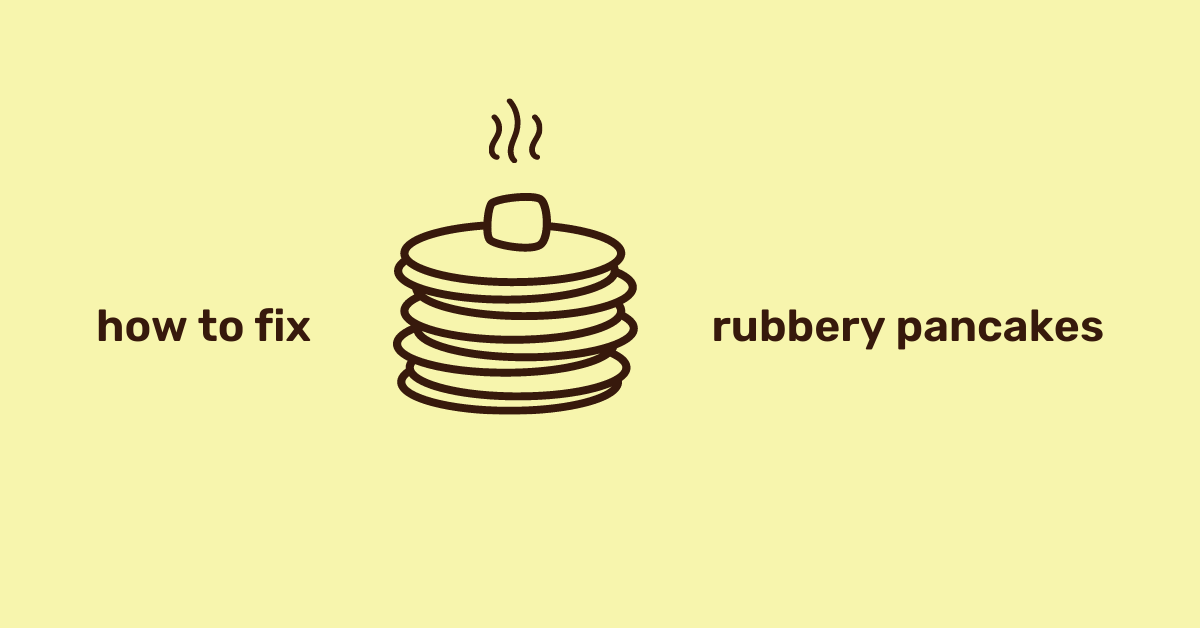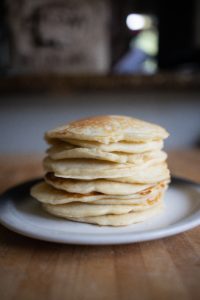How to Fix Rubbery Pancakes

As you can probably tell, nothing excites us more than sharing our insights about the lovable breakfast staple that are pancakes. They have to be one of the most iconic dishes with over 15 types of pancake recipes around the world. Working to get your pancakes to be airy, crispy, and fluffy takes practice. As simple as the ingredients are to make this popular dish, it can be just as easy to make slight errors in preparation, causing the pancakes to be dense, gummy, or flat. With all the love that we have for preparing this classic breakfast dish, we decided to answer one of the most common questions asked by pancake lovers, which is – how to fix rubbery pancakes?
As much as we may love the art of cooking, it’s absolutely normal to find ourselves making small mistakes.
Sometimes that can lead to great discoveries, other times it can lead to catastrophic results. Either way, the more we try out our recipes, the more experienced we become and the better our food eventually tastes. While pancakes involve only a few ingredients, it is very easy to make slight errors in preparation, which can result in an undesirable batch. However, there are ways in which we can fix our batter to avoid such bad batches. Before we learn how to fix rubbery pancakes, let’s go over the key ingredients needed to make a winning batch.
How to Prepare Pancakes
Preparing pancakes from scratch is not as daunting as it may seem. Pancakes require only a few ingredients that are commonly found in our kitchens:
- Flour: The most commonly used types of flour are all-purpose, whole wheat, or buckwheat flour, as a gluten-free option.
- Sugar: While granulated sugar is most recommended, it is also possible to use coconut, brown, or raw sugar as substitutes for pancakes.
- Baking Powder: For truly fluffy pancakes, baking powder is the magical ingredient that brings the batter to life. For best results, use a freshly opened can of baking powder.
- Salt: This ingredient is necessary to help balance the sugar, and give the pancakes some taste. If no salt is used, the pancakes may end up tasting bland.
- Milk: Any type of milk, dairy or non-dairy, is suitable to use for pancake batter.
- Butter: Both salted and unsalted butter are suitable. However, if you prefer the pancakes to be plant-based, you can use coconut oil as a substitute.
- Eggs: This ingredient is the glue that holds the batter together and provides texture. As a substitute, you can use ground flaxseed mixed with water.
- Vanilla Extract: The vanilla acts as a sweetener and adds flavor to the pancake. Other flavor extracts may be used to make the pancakes to your liking.

Key Steps to Follow When Frying Pancakes
While there are different methods to cook a delicious batch of pancakes, we thought it would be useful to compile a list of general tips to help you fry the perfect stack of pancakes every time.
- Whisk all the dry ingredients – flour, baking powder, salt, and sugar – separately. (Wire whisks are best for mixing dry ingredients.)
- Use warm milk and melted butter.
- Mix the wet ingredients separately.
- Add the dry mixture to the wet ingredients and stir to create the batter
- Use a flat pan to allow for even distribution of heat. You can use a non-stick, skillet, or cast iron pan.
Common Mistakes that Lead to Rubbery Pancakes
After completing all the steps above, it can be frustrating to discover that your fresh stack of pancakes turn out to be elastic, rubbery flatbread. There are a few reasons as to why your pancakes have unfortunately turned out this way. Before we can fix them, let’s take a look at some of the most common mistakes people make which result in rubbery pancakes.
Over-Mixing the Batter
Flour is an essential ingredient when making pancakes. When you mix flour with water, it creates gluten, a protein responsible for a dough’s elasticity. However, by excessively mixing, and activating the gluten, this may cause your pancakes to develop a gummy and elastic consistency. When preparing the batter, avoid over-mixing the ingredients as it leads to the formation of gluten, which ultimately makes the pancakes rubbery. Instead, mix the ingredients just until they’ve combined.
Excess Number of Eggs
Eggs provide additional support to bring the batter together and allow the pancakes to rise. However, using too many eggs in your mixture can make the pancakes more dense and rubbery. In addition, adding fewer eggs can make the mixture more dry and crispy.
Adding Too Much Baking Powder
Baking powder is responsible for providing pancakes with their sought after fluff. If too much baking powder is added to the batter, it will cause the pancakes to have a chalky flavor and a gummy consistency.
Inconsistent Temperature When Cooking
Setting your stove to a temperature that is either too hot or too cold, will produce an undesirable pancake.
Using Refrigerated Batter
While there are efficient ways to store and use pancake batter at a later time, it’s important to know how to reactivate the batter before use. Failure to adequately revive the batter will cause pancakes to be soggy and flat. Most active ingredients, such as baking powder, will lose their effectiveness, resulting in tough and rubbery pancakes.
Using the Wrong Equipment
It is important to use the proper equipment for mixing the ingredients. Using small bowls, or incorrect utensils, can lead to the disproportionate mixing of the batter, producing rubbery pancakes.
How to Fix Rubbery Pancakes
While there are many ways to accidentally produce rubbery pancakes, the brightside is that there are just as many ways to fix your batter.
- Use Gluten Free Flour: Although all-purpose flour is ideal, using gluten-free flour makes it easy to avoid gluten formation, even when you may over-mix the ingredients.
- Avoid Preparing Batter Too Far in Advance: Preparing a fresh batch of batter, right before cooking, ensures that the ingredients remain active. It prevents the loss of activation initiated by the baking powder, making pancakes fluffier and softer.

Aida Solomon is a digital marketing specialist who’s passionate about bringing her creative ideas to life. As an avid homecook, Aida loves to explore the way food has the power of bridging the world together. When she’s offline, she loves to travel through new recipes, and run long distances — paying homage to her Ethiopian roots.
